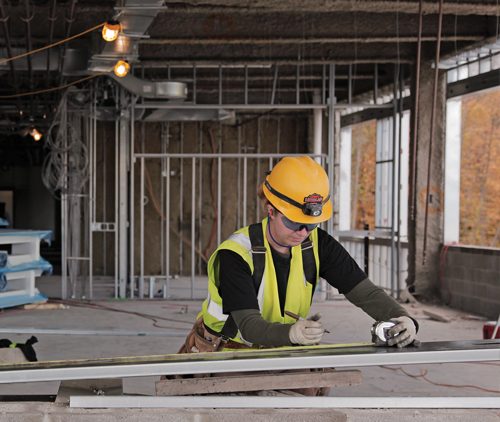A strong union needs skills, benefits and ACTION!

Central New York Business Journal: PRE-APPRENTICE PROGRAM HELPS WOMEN ENTER CARPENTRY INDUSTRY
5/11/23 | By Traci DeLore
Women looking to get into carpentry and unsure of where to start have a resource in the Sisters in the Brotherhood and an eight-week pre-apprentice program just for women.
As part of the North Atlantic States Regional Council of Carpenters, the Sisters in the Brotherhood program runs this summer at training centers around the state to give women the opportunity to begin careers in the building trades.
“It was difficult for women without any experience to come in the traditional way,” says Nicole Grodner, Carpenters Local 290 Council representative and New York chair of the Sisters in the Brotherhood Committee. Typically, applicants are accepted into apprenticeships based on experience, placing those without any experience low on the list.
This program helps open that door for those who complete it, Grodner says, as they graduate from the program with knowledge of tools and more. “They’re job-site ready. They have the confidence.”
Megan Foote, of Mohawk, completed the program in the summer of 2022 and has worked steadily since.
“The pre-apprentice program touches [upon] on a whole bunch of different things,” Foote says. Carpentry work can include wood framing, concrete work, interior metal framing, drywall installation, ceilings, window installations, flooring, doors and hardware, finish/trim work, mill work, furniture installation, pile driving, and marine construction and diving.
Along with obtaining certain OSHA (Occupational Safety and Health Administration) certifications necessary to move on to the five-year carpenter’s apprenticeship, the program also provides a $500 scholarship that participants can use toward acquiring their own set of tools and paying union fees.
Foote was working as a nurse until the COVID-19 pandemic hit. She worked with the wife of a union representative, and while she didn’t have any experience, the program sounded like a good option.
“My dad, he always worked in construction,” Foote recalls. “I like working with my hands. I like being active. I like putting in a hard day’s work.”
She got a job with Martin Zombek Construction Services in DeWitt after graduation and is busy now working on the Colonial II Apartments renovation project in Rome. The $41 million project is rehabilitating and modernizing 74 units that serve senior citizens and people with disabilities.
Foote says her employer is already investing in her continued education in the trades and she’s currently taking a blueprint-reading class at its request. Her managers “see how hard I strive and the pride I take in my work, and they make sure they take care of me, too,” she says.
While she initially took a pay cut to switch careers, Foote says that once she completes her apprenticeship, her earnings should match what she made in nursing but with better health benefits and a pension.
There is no doubt the construction industry is still a male-dominated one, Grodner says, but things have come a long way.
“I think as a woman in the trades, you do have to prove yourself,” she says, but the perception of women in construction is changing “because we’re out there doing the work and succeeding.”
The pre-apprentice program has graduated more than 100 women since it began in 2015, and the Sisters in the Brotherhood are always actively out there recruiting more women into the industry by reaching out to school districts and participating in career fairs.
The goal is to let young women know the option is there, Grodner says.
The program is open to women aged 17 and older with a high-school degree or equivalent. In order to participate, those interested must attend an information session held in the months leading up to the program. This year’s sessions were held from January through March. The program begins in May.